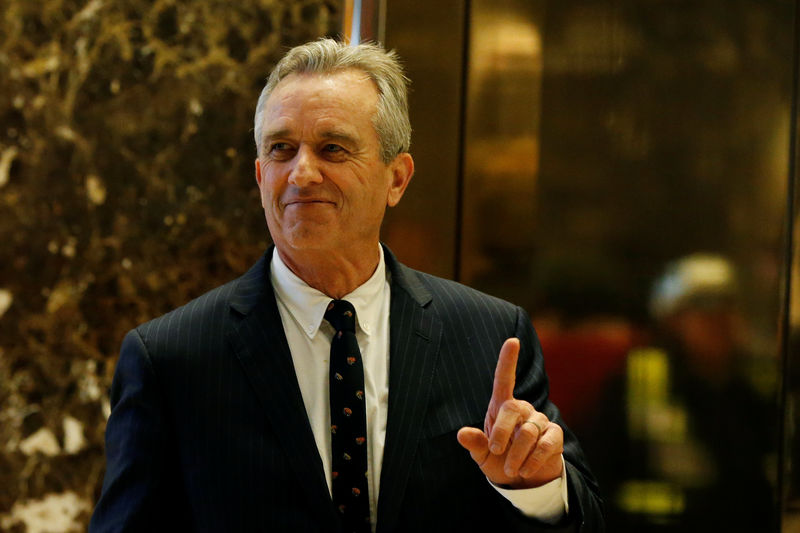By Julie Steenhuysen
CHICAGO (Reuters) - Vaccination skeptic Robert F. Kennedy Jr. said he would chair a presidential panel to review vaccine safety and science at U.S. President-elect Donald Trump's request, drawing fierce criticism from vaccine experts who fear such a panel would give credence to debunked theories tying childhood immunizations to autism.
"President-elect Trump has some doubts about the current vaccine policy, and he has questions about it," Kennedy, who has raised questions about the safety of vaccines, told reporters after a meeting with Trump in New York on Tuesday.
"He asked me to chair a commission on vaccine safety and scientific integrity. I said I would," said Kennedy.
However, Trump spokeswoman Hope Hicks later told Reuters that, while the president-elect was exploring the possibility of forming a committee on autism, "no decisions have been made at this time."
Kennedy, an environmentalist and lawyer, is the son of the late U.S. Senator Robert F. Kennedy of New York and the nephew of assassinated Democratic President John F. Kennedy.
Vaccine experts decried the announcement by a vaccination skeptic that he would head a panel to explore the safety of vaccines and their purported link with autism. The association was raised by a paper published in the British medical journal in The Lancet in 1998 that claimed to find a connection between the measles, mumps and rubella (MMR) vaccine and autism.
That paper has been debunked, and The Lancet withdrew the study. Since then, numerous studies have affirmed the safety of the vaccine.
The American Academy of Pediatrics said vaccines are "the most significant medical innovation of our time," adding that claims that vaccines are linked to autism or are unsafe have been disproven "by a robust body of medical literature."
In addition to measles, mumps and rubella, vaccines protect children and adults against a wide variety of deadly or crippling diseases, including polio, typhoid, diphtheria and tetanus.
Dr. William Schaffner, an infectious disease expert at Vanderbilt University's medical school in Nashville, Tennessee, who advises the federal panel that sets U.S. vaccine policy, said the Kennedy news reinforces the concerns of public health officials, pediatricians and family doctors.
Schaffner said Kennedy has "raised issues that have been settled securely and completely by good science."
Nevertheless, concerns have persisted over a link between vaccines and autism, a range of symptoms that often includes difficulties with communication and social interaction.
Kennedy, 62, said Trump, 70, was "very pro-vaccine, as am I," but said, "Everybody ought to be able to be assured that the vaccines that we have (are) ... as safe as they possibly can be."
In 2014, Trump, a New York businessman who was not yet a presidential candidate, posted on Twitter, "I believe in vaccinations but not massive, all at once, shots. Too much for small child to handle. Govt. should stop NOW!"
Kennedy in 2005 wrote an article for Rolling Stone magazine and the Salon.com website asserting that the government was conspiring to cover up the connections between autism and thimerosal, a mercury-based preservative formerly used in vaccines. Salon.com later retracted the article because of factual errors, and Rolling Stone deleted it.
According to the Centers for Disease Control and Prevention, there is no evidence of harm caused by thimerosal in vaccines. Thimerosal was never used in the MMR vaccine. CDC said research does not show a link between thimerosal in vaccines and autism. As a precaution, it was removed from childhood vaccines in the United States in 2001.
Daniel Johnson, a pediatric infectious disease expert at University of Chicago Medicine, said he thought yet another investigation into vaccine safety was a waste of public money.
"There's already many systems in place to provide oversight, to record data, which is constantly being reviewed by many in government and the scientific community," Johnson said. "There is no need for still yet another system for doing this."

Johnson said he was "very concerned" that parents may delay getting their children vaccinated as they await word from a vaccination safety panel, which could result in "increased harm, illness and potentially death" of children from diseases that could be prevented by vaccines.